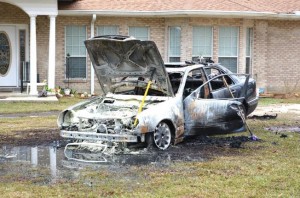Growing up in a civil rights family in Bogalusa, Louisiana, Chuck Hicks remembers the constant threats. “We were a marked family,” he told TheFightBack in an extended interview on the eve of the October dedication of the MLK Memorial. It turns out, Hicks’ use of the past tense may have been wishful thinking.
Around 3 a.m. on Jan. 16, Barbara Hicks Collins, Chuck’s sister, heard a loud knock. She opened the door only to find no one there and her Mercedes Benz in flames. It appears an attempt was also made to burn down the family home, where Collins and her 82-year-old mother, Valeria Hicks, live.
“It’s a suspicious fire,” State Fire Marshall Butch Browning told TheFightBack. “Hate crime is a possible motive,” he said, noting the timing of the fire which occurred on MLK Day. Browning said his office’s investigation of the incident is ongoing and is being done in coordination with the local police and FBI.
Washington Parish’s The Daily News noted that the investigation “uncover[ed] a small burned hole on the roof of the house and an apparent trail of accelerant leading from the ground below it to the car.”
After the Hicks’ home burned down in 2007 – due to an undetermined cause – the family installed fire-resistant shingles, which Collins called “a good investment.” “We are just wondering whether there’s a connection between this fire and that fire,” Collins toldTheFightBack.
In typical Hicks fashion, Valeria Hicks refused to let the incident slow her down. As investigators examined the car and house on the morning of Jan. 16, Ms. Hicks took part in an MLK parade, where she was honored, Collins said.
Ms. Hicks’ late husband, Robert Hicks, possessed a similar tenacity. He founded the Bogalusa chapter of the Deacons for Defense and Justice, a group whose members carried weapons in order to fend off attacks from the Ku Klux Klan.
But “his role in the civil rights movement went beyond armed defense in a corner of the Jim Crow South,” The New York Times noted in a 2010 obituary. “He led daily protests month after month in Bogalusa – then a town of 23,000, of whom 9,000 were black – to demand rights guaranteed by the 1964 Civil Rights Act.”
Whereas the Deacons used guns to fend off would-be attackers, now the weapon of social media must be utilized, Chuck Hicks said in a video message posted on YouTube. By spreading the word far and wide “we can ensure that protection is given to my family, as well as a thorough investigation,” Hicks said.
“I’m afraid. Very afraid,” Collins said. “There’s a possibility that they could come back and try again. That’s why we’re trying to reach out.”
See Chuck Hicks’ video message below:
Related stories:
The Civil Rights Movement – and the Deacons for Defense – in Bogalusa, Louisiana, Nov. 7, 2011
Chuck Hicks on the MLK Jr. Memorial Dedication, the Occupy Movement and D.C. Statehood, Oct. 14, 2011

